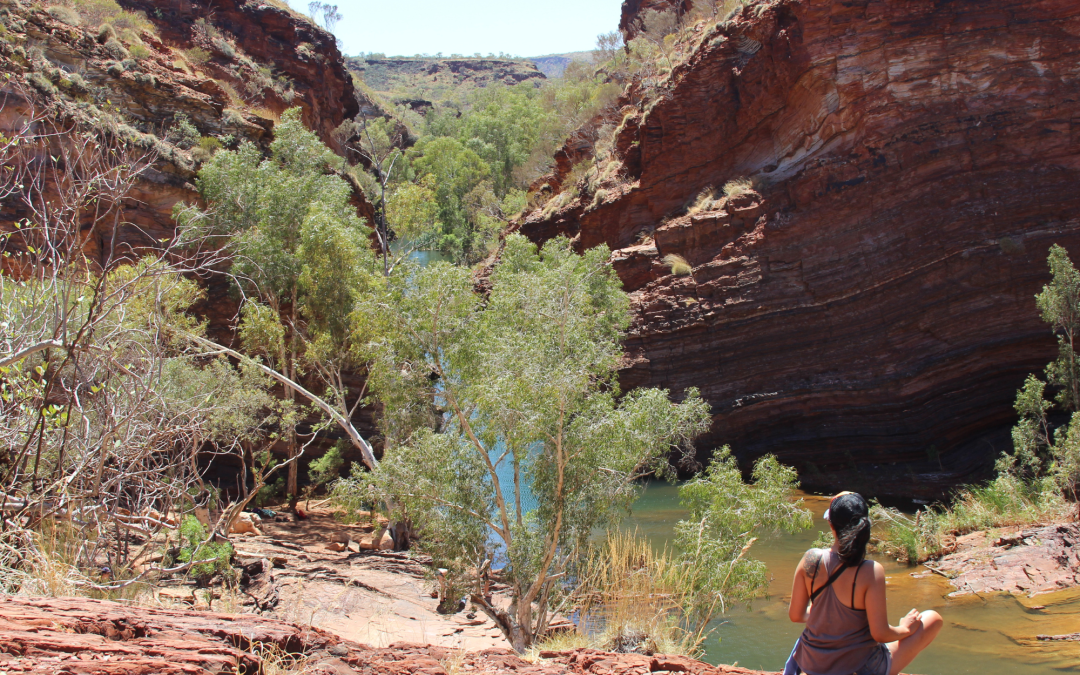By Lynn Whyatt – RRR Network Story-Teller
There’s a certain magic in standing at the edge of the ocean with your feet buried in warm sand, a swell of blue stretching endlessly before you. For Paloma, the sea has always been more than just a view – it has been a place of transformation. She describes Western Australia as “paradise,” a place where nature breathes into the everyday. Her first child was born in Perth, and she still remembers those sacred moments by the water while pregnant, feeling the pulse of waves, the vastness of sky, and the miracle of life growing within her. “It was magical,” she reflects with a flowing undercurrent of gratitude.
Born in the mountains of Colombia, Paloma’s journey to Australia wasn’t a straight line. Eight years ago, she and her partner began a chapter of exploration, travelling between continents and raising their children between the stillness of Dunsborough and the city of Perth, which boasts a strong connection to the sea. “For the kids,” she says, “these spaces in nature are magical.” Dolphins dancing in the bay, forest trails to wander, and the freedom to simply be in nature are not only important aspects of growing up, but they are also meaningful to her – a child of nature who often reflects on the mountains of her homeland.
But like many regional women, Paloma is acutely aware of what’s missing. The dream of living down south has been tempered by the harsh realities of housing shortages and limited work opportunities. “We would love to live more regionally,” she shares. “But rentals are too hard. Maybe one day we’ll buy and fix something up.” Her desire is rooted not in escape but in connection – to land, forest, and the rhythm of nature she remembers from home. A place where her children can run and dance, feel safe, and learn and grow strong in the outdoors.
Paloma’s belief in education goes far beyond the classroom. Her passion lies in learning through nature – mud under fingernails, the hum of insects, the joy of movement. Because her son has a lot of energy, he has had a few issues at school, but Paloma saw that energy in her son as his culture and spirit. So she pushed for play, for dancing, and for more time outside to channel his energy into exploration and expression rather than suppressing it. “They listened,” she smiles. “And he’s doing so much better.” She also noted that they encourage the other students to take movement breaks and spend more time outside, and it seems to be benefiting the whole class. This deep trust in the wisdom of movement, art, and cultural connection shapes everything she does.
Before moving to Australia, Paloma worked as a social communicator with a specialisation in videography – documenting powerful stories in Indigenous communities across Central and South America, navigating topics like cultural resilience, violence, and social reform. She uses audio-visual storytelling as a form of research and resistance. “It’s what I do,” she says simply. “I listen, I film, I share what needs to be seen.”
Here in WA, she’s rebuilding her networks bit by bit, woman by woman. From the Sister Project to the RRR Network itself, she is carving space for herself and others. Through migrant women’s groups, she’s helping others find their voice, access support, and grow new businesses. “Before, it was so hard,” she admits. She reflected on the difficulty of striking up a conversation with the other mums from school. Sometimes she could not find the words, or they could not understand her accent. “To be a mum, to speak broken English – it was lonely. But now I’m starting to find my people. We support each other.”
A key thread in her growing web of connection was meeting Ashley McGrath, CEO of the independent association CEOs for Gender Equity Inc. Ashley champions the idea that a gender-balanced workplace makes good business sense and that real change begins with leadership from the top. Paloma admires Ashley’s active support of other women and mothers in their job search, so much so that she now finds herself becoming a connector too – offering guidance and support to others through her involvement with the Sister Project.
In forging her own network, Paloma now coordinates a media-focused enterprise alongside other professional migrant women. Together, they navigate the complex process of transferring their skills into the Australian business landscape while building confidence in their English. Knowledge, Paloma believes, is powerful – but sharing that knowledge for the good of others? That’s where real strength lies.
Paloma dreams of professional autonomy. Even with the established networks, it’s a process. She’s slowly rebuilding her own business, contributing to marketing and storytelling projects, hosting events, and diving back into her craft. “It makes me feel alive,” she says. “When you do what you love, it gives you freedom. I want that again.”
And if she had the chance to whisper into the ears of every woman across the regions? Her message is clear: support each other. Empower one another. Let’s share the knowledge our grandmothers, aunties, and mothers gave us. Let’s bloom together.
In a world often too loud, too fast, and too disconnected, Paloma’s words settle softly in the heart: that through friendship, sisterhood, and creativity – we bloom.

